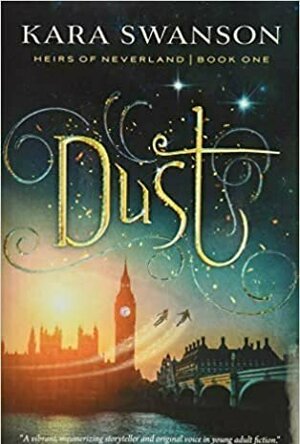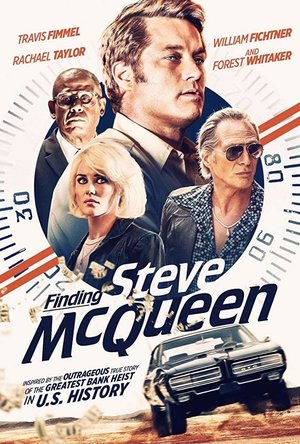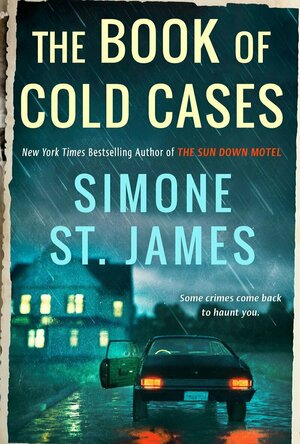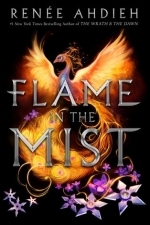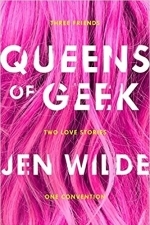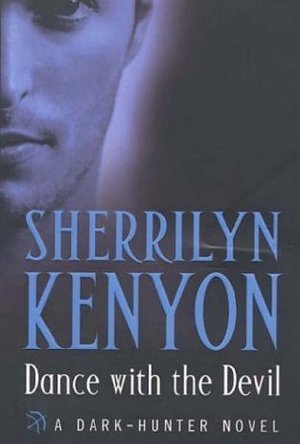Search
Search results
TravelersWife4Life (31 KP) rated Dust (Heirs of Neverland, #1) in Books
Feb 24, 2021
<a href="https://travelingwife4life.wordpress.com/2020/08/05/the-dust-celebrate-lit/">Travelers Wife 4 Life</a>
Wholly Guacamole was this a captivating book! Take it from someone who was pretty indifferent to the tale of Peter Pan and his adventures before this book, that you will be immersed in a world full of life, dreams, and the pursuit of finding a family. This is Kara Swanson’s first book in her Heirs of Neverland series, and I already can not wait to get my hands on the second book! Dust was AMAZING!
<b>“Play it safe, you mean. I’ve never wanted to be safe Lily. I want to stop hook and save Neverland- even if that means a bit of danger. A smirk tugs at my lips. “Especially if it means danger.”- Peter Pan</b>
The characters in this story were unlike any I have encountered before. They were very real and raw, talking about issues outside of the realm of make-believe and “Magic”, and dealing with them in very lifelike ways. The characters do not fit the mold for Peter Pan and his gang, which I thoroughly loved. Peter had such growth through the story that it was almost tangible. Claire was dreamlike and I enjoyed seeing her unique perspective of Peter and Tiger Lily. I believe Claire is a very relatable character and I am so excited to see where Kara Swanson leads her in the next book. Plus, I loved the hint of romance between Claire and Peter; I am a sucker for a sweet coming of age romance. Both main characters show tremendous growth by the end of the story, Peter maybe a new favorite of mine in terms of character growth and self-reflection.
<b>“His whole face lights up with delight, like a child inviting a grown-up to see a new creation they’ve made. He’s inviting me into his world.” – Claire</b>
The setting for this book is partially the US and then moves to London, which is to be expected; I mean how can you tell the story of Peter Pan without Big Ben? It flows beautifully with Kara Swanson’s edgier tale of Peter and the Lost Boys. From dancing fairies to the feeling of gliding through the air Kara Swanson describes the actions and emotions of the characters in vivid detail making me feel like I was gliding alongside Peter ready for any adventure to come our way. I truly enjoyed this tale and cannot express my anticipation for the next book in the series to release!
I give this book 5 out of 5 stars for the amazing characters, the great twist on a classic tale, and for making me like the story of Peter Pan and the adventures of Lost Boys. I will definitely be reading my kids this story someday, much better than even the original!
<b>“You were created for more than to bear the weight of your shadows- but you have to choose to no longer let them define you. You have to choose to let the light shine through the shattered pieces.” – Tiger Lilly</b>
I could go on forever quoting this book…so you can check out my <a href="https://www.instagram.com/travelerswife4life/">IG</a>; or <a href="https://twitter.com/TravelersWife4L">Twittert</a>; for some more amazing quotes!
*I volunteered to read this book in return for my honest feedback. The thoughts and opinions expressed within are my own.
Wholly Guacamole was this a captivating book! Take it from someone who was pretty indifferent to the tale of Peter Pan and his adventures before this book, that you will be immersed in a world full of life, dreams, and the pursuit of finding a family. This is Kara Swanson’s first book in her Heirs of Neverland series, and I already can not wait to get my hands on the second book! Dust was AMAZING!
<b>“Play it safe, you mean. I’ve never wanted to be safe Lily. I want to stop hook and save Neverland- even if that means a bit of danger. A smirk tugs at my lips. “Especially if it means danger.”- Peter Pan</b>
The characters in this story were unlike any I have encountered before. They were very real and raw, talking about issues outside of the realm of make-believe and “Magic”, and dealing with them in very lifelike ways. The characters do not fit the mold for Peter Pan and his gang, which I thoroughly loved. Peter had such growth through the story that it was almost tangible. Claire was dreamlike and I enjoyed seeing her unique perspective of Peter and Tiger Lily. I believe Claire is a very relatable character and I am so excited to see where Kara Swanson leads her in the next book. Plus, I loved the hint of romance between Claire and Peter; I am a sucker for a sweet coming of age romance. Both main characters show tremendous growth by the end of the story, Peter maybe a new favorite of mine in terms of character growth and self-reflection.
<b>“His whole face lights up with delight, like a child inviting a grown-up to see a new creation they’ve made. He’s inviting me into his world.” – Claire</b>
The setting for this book is partially the US and then moves to London, which is to be expected; I mean how can you tell the story of Peter Pan without Big Ben? It flows beautifully with Kara Swanson’s edgier tale of Peter and the Lost Boys. From dancing fairies to the feeling of gliding through the air Kara Swanson describes the actions and emotions of the characters in vivid detail making me feel like I was gliding alongside Peter ready for any adventure to come our way. I truly enjoyed this tale and cannot express my anticipation for the next book in the series to release!
I give this book 5 out of 5 stars for the amazing characters, the great twist on a classic tale, and for making me like the story of Peter Pan and the adventures of Lost Boys. I will definitely be reading my kids this story someday, much better than even the original!
<b>“You were created for more than to bear the weight of your shadows- but you have to choose to no longer let them define you. You have to choose to let the light shine through the shattered pieces.” – Tiger Lilly</b>
I could go on forever quoting this book…so you can check out my <a href="https://www.instagram.com/travelerswife4life/">IG</a>; or <a href="https://twitter.com/TravelersWife4L">Twittert</a>; for some more amazing quotes!
*I volunteered to read this book in return for my honest feedback. The thoughts and opinions expressed within are my own.
Sarah (7800 KP) rated Finding Steve McQueen (2019) in Movies
Nov 3, 2020
Not much of a heist
Finding Steve McQueen is a heist drama centring around a young man who idolises Steve McQueen, and follows him as he joins a gang of thieves as they plot to steal millions from President Nixon’s secret funds. This is loosely based around a true story and is told from the point of view of the gang’s getaway driver Harry Barber, with his McQueen inspired locks and mannerisms.
The tale of the 1972 heist is recounted by Barber (Travis Fimmel) to his girlfriend Molly Murphy (Rachael Taylor) in 1980, after having been on the run from the FBI for 8 years. This starts out as though it could be a rather fun and lighthearted heist movie, but I’m afraid despite it’s short 90 minute run time, it feels rather drawn out and dull. Right from the get go, the cinematography, directing style and just general look of this film just doesn’t feel right. It feels like it has been made for tv, it has that rather cheap look about it and sadly the camera angles and character styling do nothing but reinforce this. The CGI, whilst infrequent, is very bad and you can spot the green screen scenes a mile off. Even the car chase scene is lacklustre and unimpressive. You can tell that this hasn’t had a lot of money thrown at it.
The performances too I’m afraid are also rather lacking, although a large part of this is likely down to the often dodgy script that seems to enjoy ramming 70s references down our throats whilst being completely unconvincing about every other aspect of the story. I haven’t see much of Travis Fimmel, so I’m not sure if his goofy persona in this is his acting style or in character, but either way it doesn’t always work. Rachael Taylor’s Molly seems out of place and rather unlikeable and it’s only Forest Whitaker as FBI Agent Howard Lambert who comes out unscathed, playing a rather aloof and unfazed agent on the tail of the gang following the heist.
The heist itself is really the main problem here. Instead of being a heist movie, this plays out like a romance with a little bit of heist thrown in, and not a very exciting one at that. There are some moments of intrigue and fun when you see how the gang pulled the heist off and later on how they got caught, but apart from this it’s probably one of the dullest heists I’ve ever seen. Aside from a decent soundtrack, there is very little excitement in this. The motive for the heist also seems rather fuzzy and far fetched. Even the romance seems forced and wavers between being very fake and unconvincing to rather cringeworthy and cliched.
There’s also the question of whether this movie succeeds in finding Steve McQueen, and whilst it is undoubtedly a homage to the man himself, it is not a very successful one. It references all the right things but unfortunately struggles to get close to the man himself and as heist movies go, it may have done itself a disservice by trying to liken itself to McQueen and his successes. Overall I’m afraid this is a rather dull heist film that even with a low budget could’ve been much better.
The tale of the 1972 heist is recounted by Barber (Travis Fimmel) to his girlfriend Molly Murphy (Rachael Taylor) in 1980, after having been on the run from the FBI for 8 years. This starts out as though it could be a rather fun and lighthearted heist movie, but I’m afraid despite it’s short 90 minute run time, it feels rather drawn out and dull. Right from the get go, the cinematography, directing style and just general look of this film just doesn’t feel right. It feels like it has been made for tv, it has that rather cheap look about it and sadly the camera angles and character styling do nothing but reinforce this. The CGI, whilst infrequent, is very bad and you can spot the green screen scenes a mile off. Even the car chase scene is lacklustre and unimpressive. You can tell that this hasn’t had a lot of money thrown at it.
The performances too I’m afraid are also rather lacking, although a large part of this is likely down to the often dodgy script that seems to enjoy ramming 70s references down our throats whilst being completely unconvincing about every other aspect of the story. I haven’t see much of Travis Fimmel, so I’m not sure if his goofy persona in this is his acting style or in character, but either way it doesn’t always work. Rachael Taylor’s Molly seems out of place and rather unlikeable and it’s only Forest Whitaker as FBI Agent Howard Lambert who comes out unscathed, playing a rather aloof and unfazed agent on the tail of the gang following the heist.
The heist itself is really the main problem here. Instead of being a heist movie, this plays out like a romance with a little bit of heist thrown in, and not a very exciting one at that. There are some moments of intrigue and fun when you see how the gang pulled the heist off and later on how they got caught, but apart from this it’s probably one of the dullest heists I’ve ever seen. Aside from a decent soundtrack, there is very little excitement in this. The motive for the heist also seems rather fuzzy and far fetched. Even the romance seems forced and wavers between being very fake and unconvincing to rather cringeworthy and cliched.
There’s also the question of whether this movie succeeds in finding Steve McQueen, and whilst it is undoubtedly a homage to the man himself, it is not a very successful one. It references all the right things but unfortunately struggles to get close to the man himself and as heist movies go, it may have done itself a disservice by trying to liken itself to McQueen and his successes. Overall I’m afraid this is a rather dull heist film that even with a low budget could’ve been much better.
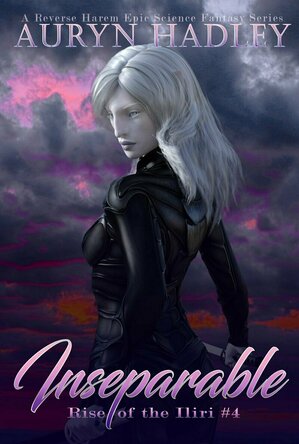
Inseparable (Rise of the Iliri #4)
Book
DISASTER! THE BLACK BLADES DISBANDED, AN ALLIANCE IN TURMOIL... Growing ever more tender yet always...
Heather Cranmer (2721 KP) rated The Book of Cold Cases in Books
May 5, 2022
I love a thriller that involves a chilling ghost story, so when I heard about The Book of Cold Cases by Simone St. James, I knew I had to read it. (Plus, I loved her other book The Broken Girls.) I was heavily immersed in this novel from the beginning!
I was sucked into the plot of The Book of Cold Cases right away. St. James gets right down to the nitty-gritty in the very first chapter. This book instantly grabs you and doesn't let go until the very last page. I was instantly transported to this small town in Oregon where I was right with the characters. As with her previous books, Simone St. James tells the story from more than one characters' point of view. We are told the story from Beth's, Shea's, and Lily's viewpoint. There was plenty of action and mystery to keep me intrigued throughout my reading journey. My favorite scenes in the book were the ones that involved the supernatural. I loved reading about how Greer mansion was haunted and about what supernatural activities were happening there. I also enjoyed the semi-big plot twist towards the middle of the book. However, I kept expecting an even bigger plot twist towards the end that never came which left me feeling a bit disappointed. However, this didn't really take away from the overall story that much. Something I could have done without was the romance in the book. It wasn't a major thing, but I just felt like there wasn't really a need for it. Other than that, I truly enjoyed this novel. Everything fit together really well (minus the romance), and the story was all tied together by the very end.
I felt that all the characters in The Book of Cold Cases were fleshed out enough to feel realistic whilst reading. I really liked Shea's interest in true crime since I can relate to that. I admired Shea's thirst for knowledge and how far she'd go to find out the truth of things she wanted to know. (I guess we both need closure!) I did feel like she got over her phobia a little too conveniently and quickly though. Beth was a wildcard for me throughout the book. I couldn't tell if she was guilty like many people believed or if she actually was a guilty party. I did like Beth though, and I loved her attitude she had when accused of murder. Lily was fabulously written, and I enjoyed reading about her too. I won't go into much more detail about her due to spoilers, but her part in The Book of Cold Cases was written well. The only character that kind of bothered me was Michael. I just felt like he was thrown in there as an easy way out. We're introduced to him from the beginning, and I kept waiting for some plot twist to happen involving him, but I was sadly disappointed. I just felt as if the book could have done without him.
Trigger warnings for The Book of Cold Cases include violence, murder, profanity, sexual abuse of a minor (not graphic), and kidnapping.
Overall, The Book of Cold Cases is a thrilling read with a fantastically chilling plot. With a spooky ghost story and an intriguing mystery, St. James has a real winner on her hands. I would definitely recommend The Book of Cold Cases by Simone St. James to those aged 17+ who love being scared and intrigued at the same time. You won't be disappointed.
I was sucked into the plot of The Book of Cold Cases right away. St. James gets right down to the nitty-gritty in the very first chapter. This book instantly grabs you and doesn't let go until the very last page. I was instantly transported to this small town in Oregon where I was right with the characters. As with her previous books, Simone St. James tells the story from more than one characters' point of view. We are told the story from Beth's, Shea's, and Lily's viewpoint. There was plenty of action and mystery to keep me intrigued throughout my reading journey. My favorite scenes in the book were the ones that involved the supernatural. I loved reading about how Greer mansion was haunted and about what supernatural activities were happening there. I also enjoyed the semi-big plot twist towards the middle of the book. However, I kept expecting an even bigger plot twist towards the end that never came which left me feeling a bit disappointed. However, this didn't really take away from the overall story that much. Something I could have done without was the romance in the book. It wasn't a major thing, but I just felt like there wasn't really a need for it. Other than that, I truly enjoyed this novel. Everything fit together really well (minus the romance), and the story was all tied together by the very end.
I felt that all the characters in The Book of Cold Cases were fleshed out enough to feel realistic whilst reading. I really liked Shea's interest in true crime since I can relate to that. I admired Shea's thirst for knowledge and how far she'd go to find out the truth of things she wanted to know. (I guess we both need closure!) I did feel like she got over her phobia a little too conveniently and quickly though. Beth was a wildcard for me throughout the book. I couldn't tell if she was guilty like many people believed or if she actually was a guilty party. I did like Beth though, and I loved her attitude she had when accused of murder. Lily was fabulously written, and I enjoyed reading about her too. I won't go into much more detail about her due to spoilers, but her part in The Book of Cold Cases was written well. The only character that kind of bothered me was Michael. I just felt like he was thrown in there as an easy way out. We're introduced to him from the beginning, and I kept waiting for some plot twist to happen involving him, but I was sadly disappointed. I just felt as if the book could have done without him.
Trigger warnings for The Book of Cold Cases include violence, murder, profanity, sexual abuse of a minor (not graphic), and kidnapping.
Overall, The Book of Cold Cases is a thrilling read with a fantastically chilling plot. With a spooky ghost story and an intriguing mystery, St. James has a real winner on her hands. I would definitely recommend The Book of Cold Cases by Simone St. James to those aged 17+ who love being scared and intrigued at the same time. You won't be disappointed.
Dana (24 KP) rated Flame in the Mist in Books
Sep 8, 2017
Enjoyed from beginning to end
Overall, I freaking loved this novel. It's set in feudal Japan and follows a young woman as she is being married off the the emperor's second son. Mariko is a badass, There's no other way to put it. She will take no shit from others which gets her into a lot of trouble. She's also flawed in that aspect too; she's so blinded by her stubbornness to see the actual world around her sometimes. But she's not the only character who gets depth. Her brother, who we see in almost alternating viewpoints in the story, is a character filled with flaws and pride. But that's not all. Several characters get fleshed out back stories (some more in depth than others) and seeing them all grow was a delight to read.
Let's move on to the rich details of the setting. Feudal Japan can be tricky and Renee Ahdieh did it so much justice. It's described so well, I could easily put myself into Mariko's shoes and lose myself in the story. It's so nice to have that level of detail paid attention to in novels set in a different time and place.
And that romance.... oh boy, it was steamy. I must admit my weakness for slow burn romances (especially ones that are hate-to-love) and this did not disappoint. It was a bit awkward; at first I wasn't sure who she was going to get together with, but when it hit it's stride, I was in love. I really don't want to give much away, but it was fantastic to read and fall in love with them.
I am eagerly awaiting the next in the series!
Let's move on to the rich details of the setting. Feudal Japan can be tricky and Renee Ahdieh did it so much justice. It's described so well, I could easily put myself into Mariko's shoes and lose myself in the story. It's so nice to have that level of detail paid attention to in novels set in a different time and place.
And that romance.... oh boy, it was steamy. I must admit my weakness for slow burn romances (especially ones that are hate-to-love) and this did not disappoint. It was a bit awkward; at first I wasn't sure who she was going to get together with, but when it hit it's stride, I was in love. I really don't want to give much away, but it was fantastic to read and fall in love with them.
I am eagerly awaiting the next in the series!
Haley Mathiot (9 KP) rated What Curiosity Kills (The Turning, #1) in Books
Apr 27, 2018
The Turning: What Curiosity Kills by Helen Ellis
Genre: YA, paranormal, romance
Rating: 4
Mary Richards always knew she didn't fit in exactly with everyone else, but she always attributed that to the fact that she and her sister were adopted. But when her long time crush suddenly starts showing interest in her, she randomly starts sleeping and purring in class, and she starts to turn into a cat, she knows things are never going to be the same.
I was instantly pulled into The Turning. The story starts and progresses quickly, and I read the whole thing in one day, almost fully in one sitting. It's the kind of book that you don't realize you've gotten to the next page, or the next chapter, and before you know it, you're done… but the adventure was so engaging, you forgot who you were for a while, because you were living solely in the character's shoes.
The writing was casual, but good. I rarely felt out of place or confused by what had just occurred. One of the only things that really bothered me about this book was the fact that Nick and Mary's relationship was very fast, and seemingly out of nowhere but lust. The ending, also, didn't quite have enough closure on the relationship aspect, nor on the actual story. It directly after the final exciting scene, with no smooth curve down. My heart was still racing when I got to the last page, and I felt like it should have lasted a little longer. Lastly, I wasn't sure if this book was for pre-teens, ages 12-14, or older. It would probably appeal to both age groups.
My favorite part was watching the characters show themselves for who they were. Yoon being more than what meets the eye, Octavia confessing her secrets and being willing, for love, to face her fears, and all the others, too. They were all very unique. I loved the characters and their interaction and dialogue.
Overall, I enjoyed The Turning, and look forward to the rest of the series.
Content: Some language, no sex
Recommendation: Ages 14-18, or if offended by language 16+
Genre: YA, paranormal, romance
Rating: 4
Mary Richards always knew she didn't fit in exactly with everyone else, but she always attributed that to the fact that she and her sister were adopted. But when her long time crush suddenly starts showing interest in her, she randomly starts sleeping and purring in class, and she starts to turn into a cat, she knows things are never going to be the same.
I was instantly pulled into The Turning. The story starts and progresses quickly, and I read the whole thing in one day, almost fully in one sitting. It's the kind of book that you don't realize you've gotten to the next page, or the next chapter, and before you know it, you're done… but the adventure was so engaging, you forgot who you were for a while, because you were living solely in the character's shoes.
The writing was casual, but good. I rarely felt out of place or confused by what had just occurred. One of the only things that really bothered me about this book was the fact that Nick and Mary's relationship was very fast, and seemingly out of nowhere but lust. The ending, also, didn't quite have enough closure on the relationship aspect, nor on the actual story. It directly after the final exciting scene, with no smooth curve down. My heart was still racing when I got to the last page, and I felt like it should have lasted a little longer. Lastly, I wasn't sure if this book was for pre-teens, ages 12-14, or older. It would probably appeal to both age groups.
My favorite part was watching the characters show themselves for who they were. Yoon being more than what meets the eye, Octavia confessing her secrets and being willing, for love, to face her fears, and all the others, too. They were all very unique. I loved the characters and their interaction and dialogue.
Overall, I enjoyed The Turning, and look forward to the rest of the series.
Content: Some language, no sex
Recommendation: Ages 14-18, or if offended by language 16+
Goddess in the Stacks (553 KP) rated Queens of Geek in Books
May 1, 2018
THIS BOOK WAS GREAT. It was a fun, quick read, but it involved three BFFs, one of which is autistic with social anxiety, and her friends know this and are incredibly supportive. The second girl is openly bisexual. The third friend, the boy, is Hispanic. The three of them take an epic trip to a big Comicon in LA; the bisexual girl (Charlie) co-starred in a zombie movie, and is a popular Youtuber, so when she's invited to the Con she drags her two BFFs with her. Once there, she meets an idol of hers, another Youtuber, and discovers that her idol has a crush on her! So while dealing with her douchebag ex (her co-star from the movie), the other Youtuber asks Charlie out, and the two girls start a romance.
Meanwhile, the autistic girl (Taylor) and the Hispanic boy (Jamie) have loved each other for ages but been too afraid to admit how they feel. Largely left on their own, because Charlie's manager couldn't get them VIP passes, they explore the Con, geeking out over things and meeting another autistic woman, a comic book artist who gives Taylor some amazing advice about being afraid but doing things anyway.
I really really loved this book. I loved seeing autistic characters treated by their peers as just regular people with quirks, like everyone has. Taylor's friends support her when her brain freaks out, and make allowances for her needs, but don't treat her like she's disabled or fragile. I loved seeing how tight the bonds of friendship were between the three teens, and how excited for each other they were, even when good things happening meant less time to spend with each other.
This was just a really lovely, feel-good book with lots of minority representation, by an autistic author who knows what she's talking about. This is one more book off my Autism Reading List, and my pick for a book about friendship from the Litsy Booked 2018 Challenge.
You can find all my reviews, and the full Autism Reading List, at http://goddessinthestacks.wordpress.com
Meanwhile, the autistic girl (Taylor) and the Hispanic boy (Jamie) have loved each other for ages but been too afraid to admit how they feel. Largely left on their own, because Charlie's manager couldn't get them VIP passes, they explore the Con, geeking out over things and meeting another autistic woman, a comic book artist who gives Taylor some amazing advice about being afraid but doing things anyway.
I really really loved this book. I loved seeing autistic characters treated by their peers as just regular people with quirks, like everyone has. Taylor's friends support her when her brain freaks out, and make allowances for her needs, but don't treat her like she's disabled or fragile. I loved seeing how tight the bonds of friendship were between the three teens, and how excited for each other they were, even when good things happening meant less time to spend with each other.
This was just a really lovely, feel-good book with lots of minority representation, by an autistic author who knows what she's talking about. This is one more book off my Autism Reading List, and my pick for a book about friendship from the Litsy Booked 2018 Challenge.
You can find all my reviews, and the full Autism Reading List, at http://goddessinthestacks.wordpress.com
Rachel King (13 KP) rated Summers at Castle Auburn in Books
Feb 11, 2019
With all of the series that I constantly fight to keep up with, this was a nice change with an all-in-one plot. The story is told entirely from Coriel Halsing's point of view, so the reader only gets to know things when she learns of them. Sometimes first person P.O.V. is limiting and somewhat claustrophobic, but in this case it simplified the story line and helped me to better get inside the mind of Coriel.
I grew to love Coriel as her story progressed and she matured into a strong, independent young woman. I love that she is not just a pretty face, but possesses both intelligence and wit. In many ways, this book is her coming-of-age story with a fantasy background that could have easily been traded for some other setting without compromising the character of Coriel Halsing.
I also love that Coriel is not the center of royal attention - like her sister, Elisandra - and the "handsome prince" is neither meant for her nor remotely appealing to me, the reader. It was quite entertaining for me to be constantly guessing as to whom Coriel would eventually wind up with. When the man was finally revealed, I was very happy with the results, though I would have enjoyed a bit more wooing on his part.
All of the different characters are well-developed and unique, from the narcissistic handsome prince Bryan, to the always-composed Elisandra, to the many aliora that populate the book. The aliora are quite fascinating, comparable to fairies or elves in description, but still unique to Sharon Shinn's design. In many ways, the aliora act as catalysts for political intrigue within Castle Auburn, as well as Coriel's personal development and maturation.
As an adult fairy-tale, this book can easily appeal to both teens and adults, as the romance is tastefully done and the risque topics, such as slavery, suicide, and illigitimacy, are handled with care and respect. Personally, I loved this book as much as I have loved everything else I have read from Sharon Shinn.
I grew to love Coriel as her story progressed and she matured into a strong, independent young woman. I love that she is not just a pretty face, but possesses both intelligence and wit. In many ways, this book is her coming-of-age story with a fantasy background that could have easily been traded for some other setting without compromising the character of Coriel Halsing.
I also love that Coriel is not the center of royal attention - like her sister, Elisandra - and the "handsome prince" is neither meant for her nor remotely appealing to me, the reader. It was quite entertaining for me to be constantly guessing as to whom Coriel would eventually wind up with. When the man was finally revealed, I was very happy with the results, though I would have enjoyed a bit more wooing on his part.
All of the different characters are well-developed and unique, from the narcissistic handsome prince Bryan, to the always-composed Elisandra, to the many aliora that populate the book. The aliora are quite fascinating, comparable to fairies or elves in description, but still unique to Sharon Shinn's design. In many ways, the aliora act as catalysts for political intrigue within Castle Auburn, as well as Coriel's personal development and maturation.
As an adult fairy-tale, this book can easily appeal to both teens and adults, as the romance is tastefully done and the risque topics, such as slavery, suicide, and illigitimacy, are handled with care and respect. Personally, I loved this book as much as I have loved everything else I have read from Sharon Shinn.
graveyardgremlin (7194 KP) rated Dance with the Devil (Dark-Hunter #3) in Books
Feb 15, 2019
I really don't know what to say about this book. I loved Zarek, Astrid was wonderful (I love that name!), the story was perfect. The End.
Okay, so maybe I have a bit more to say...
I believe Sherrilyn Kenyon's writing has gotten better as the series has progressed. [b:Fantasy Lover|84136|Fantasy Lover (Dark-Hunter, #0.5 Prequel)|Sherrilyn Kenyon|http://photo.goodreads.com/books/1255575870s/84136.jpg|2384] was great but a bit choppy, [b:Night Pleasures|84150|Night Pleasures (Dark-Hunter, #1)|Sherrilyn Kenyon|http://photo.goodreads.com/books/1279586240s/84150.jpg|4112814] was nice but the weakest so far and still somewhat choppy (not to mention it's the only one I've given away), [b:Night Embrace (Dark-Hunter, #2)|84140|Night Embrace (Dark-Hunter, #2) (Were-Hunter, #1)|Sherrilyn Kenyon|http://photo.goodreads.com/books/1255923065s/84140.jpg|81269] was nice and enjoyable but needed the romance developed more in the first half, but <u><b>Dance with the Devil</b></u> was wonderful all the way through.
This one felt different to me from the two previous Dark-Hunter novels; it rather had the same feeling as <u><b>Fantasy Lover</b></u>. This book was more isolated from the rest of the series because it was set in Alaska and there weren't as many characters or as much action (in the first half that is). Zarek was the perfect tortured hero and Sherrilyn Kenyon captured that...well, perfectly. I felt for all he suffered because he was more than a character in a book to me. Astrid was terrific as the nymph who is believable at helping him heal and love. Ash was, of course, wonderful, and the welcome addition of Simi added some much needed humor to a tense plot. I can't say I enjoyed Artie the Bitch; I really can't wait until she gets hers. I know Ash is getting his own book (or books, rather), and I sincerely hope he gets his freedom from her (and naturally she suffers horribly). He deserves so much better, and though he sees himself in Zarek, he also reminds me of Julian from <u><b>Fantasy Lover</b></u> with his storyline. This is my perfect book and it's staying on my keeper shelf for a very long time.
Okay, so maybe I have a bit more to say...
I believe Sherrilyn Kenyon's writing has gotten better as the series has progressed. [b:Fantasy Lover|84136|Fantasy Lover (Dark-Hunter, #0.5 Prequel)|Sherrilyn Kenyon|http://photo.goodreads.com/books/1255575870s/84136.jpg|2384] was great but a bit choppy, [b:Night Pleasures|84150|Night Pleasures (Dark-Hunter, #1)|Sherrilyn Kenyon|http://photo.goodreads.com/books/1279586240s/84150.jpg|4112814] was nice but the weakest so far and still somewhat choppy (not to mention it's the only one I've given away), [b:Night Embrace (Dark-Hunter, #2)|84140|Night Embrace (Dark-Hunter, #2) (Were-Hunter, #1)|Sherrilyn Kenyon|http://photo.goodreads.com/books/1255923065s/84140.jpg|81269] was nice and enjoyable but needed the romance developed more in the first half, but <u><b>Dance with the Devil</b></u> was wonderful all the way through.
This one felt different to me from the two previous Dark-Hunter novels; it rather had the same feeling as <u><b>Fantasy Lover</b></u>. This book was more isolated from the rest of the series because it was set in Alaska and there weren't as many characters or as much action (in the first half that is). Zarek was the perfect tortured hero and Sherrilyn Kenyon captured that...well, perfectly. I felt for all he suffered because he was more than a character in a book to me. Astrid was terrific as the nymph who is believable at helping him heal and love. Ash was, of course, wonderful, and the welcome addition of Simi added some much needed humor to a tense plot. I can't say I enjoyed Artie the Bitch; I really can't wait until she gets hers. I know Ash is getting his own book (or books, rather), and I sincerely hope he gets his freedom from her (and naturally she suffers horribly). He deserves so much better, and though he sees himself in Zarek, he also reminds me of Julian from <u><b>Fantasy Lover</b></u> with his storyline. This is my perfect book and it's staying on my keeper shelf for a very long time.
MaryAnn (14 KP) rated Argosy Junction in Books
Mar 5, 2019
I want nothing to do with Jesus or God.” After over twenty years of abuses from the cult-like church she grew up in, Lane Argosy has had it with God and His people. Though the Brethren try to make Lane and her family’s lives unbearable, freedom from their warped brand of Christianity is sweet. She’ll never go back… never. He just wanted to visit the country he’d explored through books. So, when Matt Rushby arrives in Argosy Junction, Montana, he expects idyllic meadows and craggy rocks towering above, old-fashioned friendliness and at least one or two cowboys. Instead, he finds familiar hatred and factions very much like the ones back home in Rockland’s inner-city gangs. The Argosy family is disillusioned, broken, and floundering. Matt knows the answer is Jesus—just Him and not the trappings of a faith He never designed. But how can Matt help them turn their hearts back to the Lord when he suspects Lane has stolen his?
My Thoughts: Lane Argosy isn't like every other girl you would meet,; and that's just what Matt Rushby found out when he stuck in a field of "ferocious" sheep. This was an interesting book to read. Not only was it a romance novel, set in Montana, but it's also a story about how some churches can become toxic to its members. It deals with how pride can come into our lives and not only hurt us but other people as well. It's a good reminder to always go to the Bible when in doubt about teachings in the church.
It's also a reminder that God is always there waiting for us no matter how far we stray from Him, that He is a forgiving father. It's also about forgiving others. Prayer is a great tool, and we should always turn to God in prayer over everything in our lives, big or small.
The characters are enjoyable and entertaining in this novel, the author really brings them to life for the reader and the added humor is something I enjoyed. This is a novel that all ages can and will enjoy!
My Thoughts: Lane Argosy isn't like every other girl you would meet,; and that's just what Matt Rushby found out when he stuck in a field of "ferocious" sheep. This was an interesting book to read. Not only was it a romance novel, set in Montana, but it's also a story about how some churches can become toxic to its members. It deals with how pride can come into our lives and not only hurt us but other people as well. It's a good reminder to always go to the Bible when in doubt about teachings in the church.
It's also a reminder that God is always there waiting for us no matter how far we stray from Him, that He is a forgiving father. It's also about forgiving others. Prayer is a great tool, and we should always turn to God in prayer over everything in our lives, big or small.
The characters are enjoyable and entertaining in this novel, the author really brings them to life for the reader and the added humor is something I enjoyed. This is a novel that all ages can and will enjoy!
